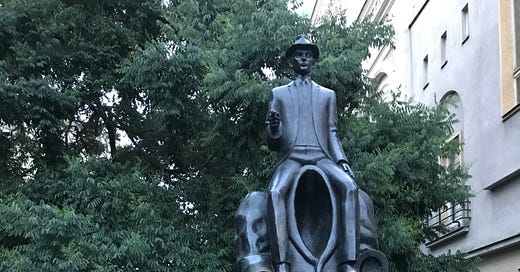Bureaucracy Ascendant
The Right had a plan that didn't work. The Left never had a plan. And the paperwork multiplied...
Me in the Jewish Quarter of Prague leaning triumphantly on Jaroslav Róna’s Statue of Franz Kafka. The monument is said to have been inspired by Kafka’s early short story, “Description of a Struggle,” but as with the short story itself, no one seems to have a clue what it means. It is, though, properly Kafka-esque.
Credit Card Companies out-Kafka-Kafka: The Trial Comes to Customer Service
The modern world has a bureaucracy problem. We’ve known this since the post-Cold War years, as words like “paperwork” started popping up in media and conversation and a spate of anti-bureaucratic books like The Peter Principle, The Bureaucratization of the World, and Bureaucrats: How to Annoy Them hit bookshelves. In other words, we’ve recognized that bureaucracy is annoying, soul-killing, and worthy of scorn and derision for decades. Apparently, we just can’t do anything about it. The world is more bureaucratic today than ever. We’re going backwards.
I’ll admit, I wasn’t planning on writing about bureaucracy. How boring. I try to, essentially, duck and cover. Hide from it. You need a spy-like furtive footprint, a feel for staying unentangled. Slip away sight unseen.
No such luck. The States greeted my return from Europe with news that my bank info had been compromised (in one of these periodic drone-like non-admissions of responsibility—didn’t someone break into your computer systems?—advising everyone to change their passwords). I didn’t think anything of it, it’s sort of like those Amber alerts you get, where you’re informed there’s a ten year old whose uncle snagged her and they’re now in a beige Dodge Caravan heading south a hundred miles from you. I didn’t think anything of it. Until I looked at my credit card. And here begins my story of bureaucracy.
Keep reading with a 7-day free trial
Subscribe to Colligo to keep reading this post and get 7 days of free access to the full post archives.





